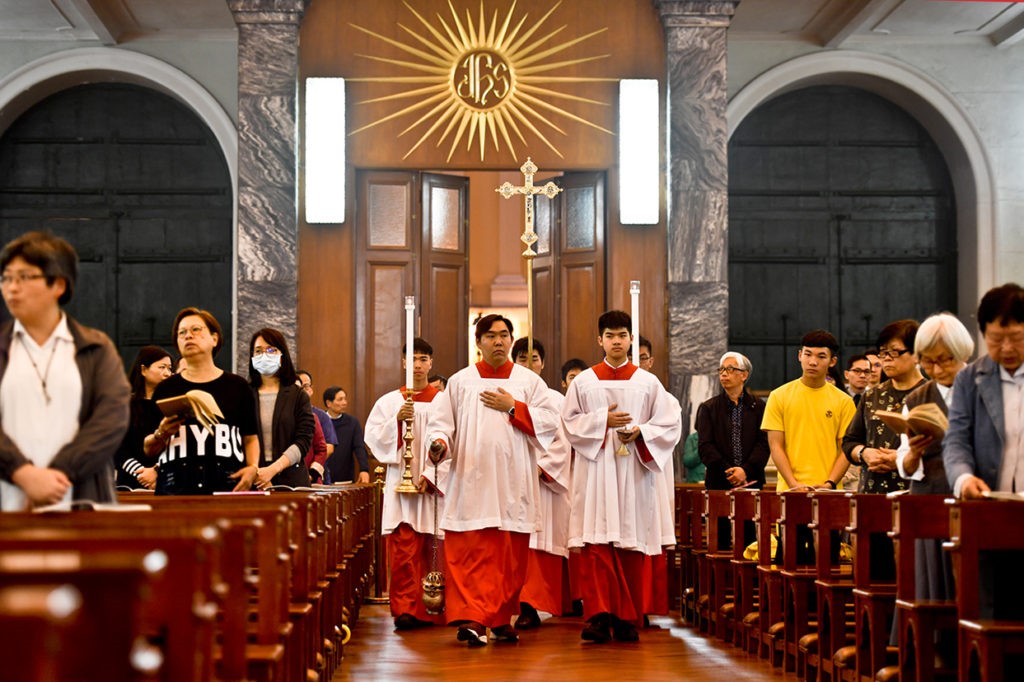Photo: Ivan Leong
Fr Leonard E Dollentas
I was mischievous when I was boy, and my father would punish me with odd and indulgent punishments.
I remember three of us boys from the neighborhood forming a gang. We raided the neighbors’ chicken hutch and collected the eggs, boiled them and ate them all. The foray was carefully planned with utmost precision. We strike in broad daylight, we take the eggs in silence and leave some behind as a gesture of benevolence to the owners. The heist was carried out “neat” and “tidy.” But on the third strike we forgot to bribe the dogs that made a lot of noise. We got caught.
The owner was more forgiving and he understood our mischievousness. But my father was furious. He organized a meeting with the parents of the other two boys and they agreed to punish us by sending us to the parish priest for confessions and volunteered us to serve in the morning Mass every day, for a month. It was the hardest punishment I ever had. In the Philippines, the weekday Mass is customarily at six in the morning. This required me to wake up early, walk towards the parish in dark and cold mornings. Nevertheless, I had to fulfill and endure the punishment and pay for the unholy crime I had committed.
The parish priest was patient with us and would even invite us for breakfast at the rectory. As it was unusual for young boys to serve in the early Mass, the daily Mass-goer brigade admired our seemingly religious dedication, without knowing we were on penalty. Although I used to attend the Sunday Mass, the early morning Mass was more than a punishment for me: its monotony was a boredom which seemed eternity, seeing the gloomy faces of those old people every morning and in that low-spirited atmosphere of the church, I felt I was having a vision of what the purgatory would be like, if I ended up there.
That vision changed when the punishment was fulfilled. Perhaps by divine intervention I started to love going to Mass. I loved to serve and work with the priest and I gained a glimpse of the priestly life. Later in my teenage years, the Mass became something I looked forward to and expected on a daily basis. It had become such an important part of my life.
DAILY MASS AND SELF DISCIPLINE
Going to daily Mass teaches self-discipline. Getting up early and beginning each day with Jesus is the perfect way to begin every day. St Josemaria Escriva says in The Way, “Conquer yourself each day from the very first moment, getting up on the dot, at a set time, without granting a single minute to laziness. If, with the help of God, you conquer yourself in that moment, you’ll have accomplished a great deal for the rest of the day. It’s so discouraging to find yourself beaten in the first skirmish.”
In addition to getting up on time every day, the Mass itself offered opportunities to learn other forms of self-discipline. The humility to sit still, to focus and not to be distracted. The reverence to listen carefully to the readings, the gospel and the homily. The courage not to engage in gossip mongering after the mass. Daily Mass, being only 30 minutes, provides a wonderful opportunity to master the virtues, as practice makes perfect. So the more we attend daily Mass, the more self-disciplined we will become.
DAILY MASS IS THE PERFECT WAY TO LEARN ABOUT SPIRITUAL LIFE IN THE HOMILY
At daily Masses, the homily is optional. If the priest prepares to have it, it is often shorter. It usually focuses on the gospel. It can be a short catechism and sometimes about the saints. As a boy, I fell in love with the saints in the homily, as we followed the liturgical year and celebrate each of their feast days. Our parish priest was a wonderful communicator. I learned from him that saints were ordinary people, sinners who decided to turn their gaze at the face of God and who should become our heroes and models.
GOING TO DAILY MASS, WE READ ALMOST THE ENTIRE BIBLE
Scott W Hahn, an American Roman Catholic theologian said that, based on the three-year cycle of Sunday Mass readings and two-year cycle of daily Mass readings, we hear 80% to 90% of the Bible during the three-year liturgical cycle. St Jerome also believed that “ignorance of Scripture is ignorance of Christ,” which is why liturgy of the Word has such importance in the Mass. Through the readings, God is speaking to us personally, allowing us to get to know Him better, and in knowing Him we come to love Him more.
WE CAN OFFER OUR MASS FOR OUR LOVED ONES — LIVING OR DEAD
The Mass is a wonderful time to thank and ask God for favors. We can offer our Mass for our children, our spouse, loved ones who have died, or for anyone who needs our prayers. In Macau, our pastors allow us to mention our petitions before the Mass. But this does not mean that we own the Mass or that the Mass is said especially for us. It rather shows that the community prays for those who need our prayers most. This is a beautiful tradition and moment to petition our Lord. We can also pray for the rescue of souls from Purgatory during the Mass, for their possible relief. Once they are in Heaven, they will be praying for us.
THE MORE WE ATTEND MASS, THE HOLIER WE WILL BECOME
Each time we receive Holy Communion, we are receiving sanctifying grace. Participating in the Holy Eucharist brings sacramental graces, which strengthens us to keep God’s life in us. This grace, if received properly, helps us increase our faith. It also helps us to live how God wants us to, and lessens our inclination to sin. Jesus assured us: “He who eats My Flesh and drinks My Blood has life everlasting and I will raise him up on the last day” (John 6:54). Daily Mass then is a source of daily help for us to become holy as St Augustine reminds us: “Know, O Christian, that the Mass is the holiest act of religion. You cannot do anything to glorify God more nor profit your soul more than devoutly assisting at it, and assisting as often as possible.” As we receive Jesus daily in the Holy Mass, let us strive to be like Him in our daily lives.


 Follow
Follow



thank you so much for the article. It was your childhood story and your step in become a priest. Thank you for sharing.